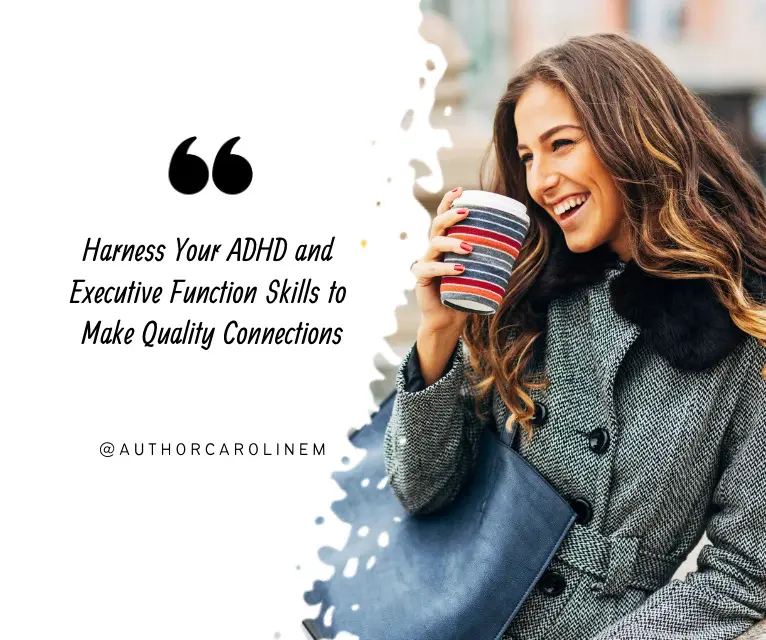How People with ADHD Develop and Overcome a Social Hangover

Can you relate to this? You wish you could say that pithy comeback to a comment that knocked you off guard. Today, you ruminate about why someone would have said that, and how you should have responded. If the comment was off-putting, you should have defended yourself or someone else with a funny and yet direct response. If the comment was complimentary, you kick yourself for not acknowledging it politely and appreciatively. Welcome to the world of social hangovers with ADHD!
Those of us who struggle with executive function challenges, may say too much, over-react, deny involvement, blurt out hurtful comments or speak in a tone that is off-putting. And since we did not read facial or non-verbal cues, we may over-compliment until the recipient feels awkward, or we stay silent since we either became distracted and miss a critical pieces of a conversation or we think that we are not “smart” enough to add to the conversation.
ADHD, Lagging Executive Function Skills and the Social Hangover
Over the years I’ve developed a framework that not only keeps me organized but also makes socializing feel so much more natural. I have introduced this to hundreds of people and they report positive results too.
Executive function is the management system of the brain and represents the different processes that work together to produce things like attention, self- management, emotional regulation, self-regulation, organization and working memory.
Every social behavior is dependent on the strength of our executive functioning. The good news is that executive function can be strengthened at any age and that having one area of weakness does not mean that the other EF areas are also weak. In fact, as a person with ADHD, you do have strengths – tremendous strengths. We all do! You have an ability, gift, talent, etc., that no one else can replicate. The key is to use this strength to guide you away from having social hangovers.
“Think of this definition of Executive Function: To have a goal; To think about how to achieve that goal; To create an action plan to get to the goal; To self‐regulate our behaviors and emotions to carry out that goal.”
~ Executive Function definition from Michelle Garcia Winner, Social Skills Coach
How Does This Executive Function Definition Translate into Your Daily ADHD Social Life?
Whether your goal is to respond to emails, to be more centered, or to pay attention to people’s body language, we need a plan and we need to manage our emotions and behaviors. This is no easy task, but it is possible if we try, practice and know how our brains work. In order to read people better we have to start by better reading ourselves and by not holding ourselves to an unreasonably high standard.
Steps to Ensuring You Don’t Feel Lonely or Isolated When You Have ADHD
1. Figure out what you have been missing and “pre-game.” Find out what you want! Notice how you feel.
I have learned that what I NEED as a person w/ ADHD to socialize:
• Hydration
• Sleep
• Someone I know or I’ll get overwhelmed
• To feel OK; good mood
• To play mental games when there’s too much talking – Related to EF
• Effort worth it
• Self-talk to be positive
What I DON’T WANT: and might need help to cope with and manage
• Crowds or I’ll get too stimulated
• Boredom; My brain needs to be fired-up
2. Use your strengths
You don’t have any strengths? I hear this often, but I know you do. Here are some strengths that others have detailed: attention to detail, compassion, bravery, exuberance, deep focus, novel approaches, creativity. We are often exuberant and very zesty. And because we crave stimulation, we might be a little too exuberant and say the wrong thing – too loudly! But we can ultimately learn how to pause and how to manage what we say, and keep the zest and the fun and the things that make us unique. Use your strengths, what allows you to feel confident and centered.
3. Micro connections
Start off small, with actionable steps that don’t require drastic measures. Try for three small connections a day, such as being the first to say hello and chatting with someone after church.
4. Speak to Yourself with Compassion
Positive self-talk helps us take a birds-eye view of a situation. Is it really as scary as we think? Are the others really smarter, prettier, funnier, etc. than us? Start a circle of support so you feel less alone.
5. Build Social Skills
Whatever the root cause of the social hangover, we can at any age build social skills. It takes practice and may feel daunting, but every little win, every skill you advance will help you make greater connections.
How To Prevent a Social Hangover with ADHD
There is no one root cause for our social hangover. For some, it’s a self-regulation issue. For others, its anxiety induced and for others it’s an amygdala hijacking! All these come from an EF challenge. Connection is the core of life. To prevent a social hangover with ADHD, we need to understand our short-comings, set things up to demonstrate our strengths, lessen our weaknesses and be gentle with ourself. Was last night really that awful, or was it just not the right situation with the right mindset?
We all need socialization!
Even if spending time with people drains you and you don’t feel like putting in the effort to attend an event, it’s important to find social skills activities that help recharge your energy and make you feel connected. For more suggestions on adult social skills development, check out our new product: Meet People with Confidence
Actionable, well-researched and accurate information to improve social lives:
More Adult Social Skills Training Resources:
How To Read the Room So You’re More Confident Around Your Co-workers
How to Read the Room as an Adult – Managing perceptions and engaging successfully




